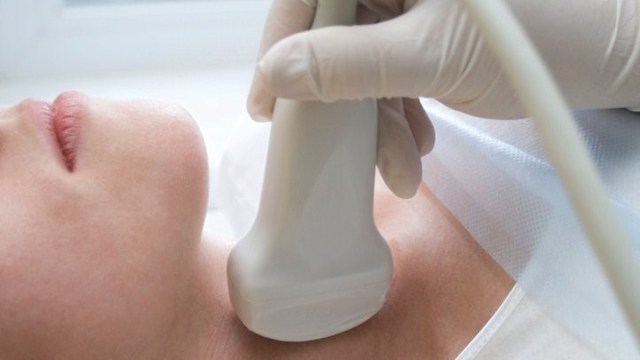 Photo: Getty Images
Photo: Getty Images
In the United States, about 5 percent of the population has hypothyroidism, or an underactive thyroid, according to the National Endocrine and Metabolic Diseases Information Service. An underactive thyroid does not produce the normal level of hormones, which affects metabolism.
To diagnose an underactive thyroid, a physician will use several tests. The National Endocrine and Metabolic Disease Information Service noted that the thyroid-stimulating hormone, or TSH, test is usually the first test used, and is also the most accurate test of the thyroid’s activity.
Patients with an underactive thyroid will have an elevated level of TSH, as the pituitary gland makes more TSH when thyroid hormones are low. The physician may also use a T4 test and a thyroid autoantibody test to diagnose an underactive thyroid.
A T4 test checks how much T4 is circulating in the patient’s blood. A patient with hypothyroidism will have lower than normal levels of T4. The thyroid autoantibody tests looks for thyroid autoantibodies, which are present in patients with Hashimoto’s disease.
Once the physician has diagnosed the patient with hypothyroidism, the next step is to choose the proper treatment. For example, if a patient has overt hypothyroidism, in which she has TSH levels of 10 mU/L or above and lower T4 levels, she will undergo thyroid replacement therapy, according to the University of Maryland Medical Center.
The patient is given synthetic thyroxine — which is identical to T4 — though how much she takes depends on how severe the hypothyroidism is, as well as other medications she is taking, her age, weight and other present health conditions.
Once the patient starts taking synthetic thyroxine, her physician will check her TSH levels every six to eight weeks. After the dose is stable, the physician will check her TSH levels every six months then once a year, noted the National Endocrine and Metabolic Diseases Information Service.
Finding the right dose of synthetic thyroxine is important, as an excessive dose can cause side effects. A patient taking too much synthetic thyroxine can have shakiness and insomnia. Heart palpitations and an increased appetite may also occur. Certain foods and medications may affect absorption of the synthetic thyroxine.
The MayoClinic.com noted that large amounts of soy products, high-fiber diets, calcium supplements, iron supplements, aluminum hydroxide and cholestyramine may interfere in absorption.
The University of Maryland Medical Center pointed out that there is a debate over the treatment of subclinical hypothyroidism, in which the patient does not have obvious symptoms, her T4 levels are normal, and her TSH levels are only slightly higher than normal. Some physicians suggest monitoring patients while other prescribe treatment.
Treatment of hypothyroidism may vary for certain cases. For example, if a patient has both hypothyroidism and an iodine deficiency, her treatment may consist of iodized salt, according to the University of Maryland Medical Center. A patient who has heart disease will start with a very low dose of synthetic thyroxine, as the treatment may cause chest pain or a heart attack.
References
National Endocrine and Metabolic Diseases Information Service. Hypothyrodism. Web. 4 January 2012
http://endocrine.niddk.nih.gov/pubs/Hypothyroidism
MayoClinic.com. Hypothyroidism: Treatments and Drugs. Web. 4 January 2012
http://www.mayoclinic.com/health/hypothyroidism/DS00353/DSECTION=treatments-and-drugs
University of Maryland Medical Center. Hypothyroidism – Treatment. Web. 4 January 2012
http://www.umm.edu/patiented/articles/how_hypothyroidism_treated_000038_7.htm
Reviewed January 4, 2012
by Michele Blacksberg RN
Edited by Jody Smith






Add a Comment7 Comments
Thanks for your reply. I am actually still waiting to hear from a doctor about this anyways. Since you mentioned table salt if you look at the can of salt it says on it "this salt is not iodide as a necessary nutrient". Two different doctors told me the difference between table salt and Iodine.
Once I see good results I will let you know.
Thanks,
January 7, 2012 - 9:18pmMelissa
This Comment
Hi Melissa,
I'm sorry you are still having issues with your thyroid and Iodine but if you have not been tested then it is best that you do not start taking supplements or medications for something that you haven't been diagnosed with. Your statement about many Americans being iodine deficient is actually misleading. Unlike in other countries, our table salt (which many Americans use to cook with) contains Iodine as well as many other popular foods such as potatoes, dairy, eggs, strawberries, and cranberries.
I hope you get answers from your doctor soon.
Rosa
January 7, 2012 - 3:46pmThis Comment
They haven't tested me for iodine. Speaking of iodine take a look at this site about how it says thyroid and iodine are important.
http://1-thyroid.com/fibrocysticbreastdisease.htm.
I even cry over my hair sometimes to. I know a certain doctor and told me if thyroid blood test is normal it is highly possible you're difficient in iodine. I purchased something called kelp which is iodine and I'm waiting to hear from the person how much I should take.
It's a good idea to check your sons iodine levels to be sure. They say many people in America are defficient in iodine.
Melissa
January 7, 2012 - 3:28pmThis Comment
Well, if they say you may be deficient in iodine, have they tested you for it? Sometime it can be hard to work the medical community, they all have their own way of approaching things. If you do not feel that you’re getting enough answers, perhaps it is time to find another doctor?
First thing, did they test your T3 & T4 or your FREE T3 and FREE T4? Those are different tests. Also, the biggest thing here would be have they done any antibody testing. Your blood tests for thyroid could be normal, (depending on which tests they do) but still be having complications with antibodies. Sometimes the thyroid disorders do not show up until the antibodies have done enough damage.
As for the hair, I hear ya! My 5 year old son just told me the other day that I should shave my head and start to wear a wig so that I would quit shedding so much. If that doesn't just about make you want to cry!
Just hang in there; it can be a journey for some to find solutions to their problems, so we just have to keep our chins up while we are on the crazy rollercoaster.
Take Care!
January 7, 2012 - 3:17pmAuntlello1
This Comment
Thanks for your reply. For T3, TSH, T4 I have been tested for all of them and they told me everything is normal. If it's normal I still did not get solution to all my problem. Since your telling me it's hyperthyroidism and I don't know what more to say to my doctor they just tell me it's normal. It's not solution though. I was told if blood test for thyroid is normal it could be you're defficient in Iodine. I don't know what more to say or do. I was told taking Kelp is natural and helps thyroid symptoms. I just started taking them and I know it takes time to see results.
What bothers me the most from all these symptoms are being very intolerant to the cold weather. I really can't handle it at all. My hair falls out alot daily and I really don't know what more to do. So far I'm on Kelp I hope I start seeing results soon.
What do you think is best that I can do? Any suggestions?
Thanks,
January 5, 2012 - 1:43pmMelissa
This Comment
Those symptoms sound more like hyperthyroidism than hypothyroidism. Have they actually tested your Free T3? Our have they ever tested you for any thyroid antibodies? Those would be the best tests to look for any problems if the standard TSH is stol within range.
When it comes to iodine, I dont mess with it. For a lot of thyroid patients who have an autoimmune condition the kelp can actually make it worse.
Best of luck!
Auntlello1
January 5, 2012 - 9:31amThis Comment
I actually have all the symptoms of hypothyroidism and I'm 28 years old. I've been suffering with many symptoms for almost all my life. I have been to an endocrinologist and I had done blood test of so many kinds and told me everything is normal.
When I read your article here and you mentioned about hypothyroidism symptoms and Iodized salt I want to say that I read a lot about iodine defficiency and thyroid in how they are important together.
I actually started taking kelp (iodine) and I know it takes time to see results. It's 150 mcg. I don't know how often I should take it though.
How often do you think is best that I take kelp?
The symptoms I have are hair loss (alopecia), weight loss, fibrocystic breasts, I'm very intolerant to the cold weather, I'm always tired during the day, I have lack of energy, my nails break alot, my eyes look bulged and hirsutism.
I'd really like to know what do you think of all this and how often I should take kelp?
Thanks,
January 4, 2012 - 7:57pmMelissa
This Comment